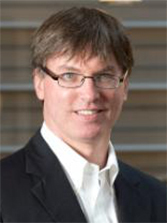Seminars
Prof. John Dolbow
Department of Mechanical Engineering and Materials Science
Duke University
Recent Advances in Regularized Models of Fracture and Accompanying Computational Methods

ABSTRACT: Over the past decade, there has been considerable progress made towards the development of gradient-based damage and phase-field models of fracture. In these methods, sharp fracture surfaces are regularized with a scalar damage field that varies continuously throughout the domain. The evolution of the damage field is governed by a secondary equation that incorporates a length scale. These models have significantly advanced the field of fracture mechanics, to the point where simulations of complex fracture processes are beginning to be truly predictive in some relatively simple cases. Although these models have seen considerable success, they have also suffered from a number of shortcomings. These include, for example, challenges in modeling fracture in coupled problems, difficulties in recovering the sharp fracture geometry, and the computational expense of resolving the length scale. In this seminar, we discuss recent advances in both the development of new models and the accompanying discretization strategies. Topics will include regularized models for ductile fracture and crack nucleation, as well as computational strategies for enabling continuous-to-discontinuous transitions and facilitating multi-resolution approaches. Finally, we will present applications of these methods to a wide range of problems in fracture mechanics, with particular focus on their potential for explaining experimental observations as well as their current limitations.
BIOGRAPHY: John Dolbow is a Professor of Mechanical Engineering and Materials Science at Duke University, where he directs the Duke Computational Mechanics Laboratory. He currently serves as an Assistant Vice President for Research, where he leads Duke's Research Data Initiative. Professor Dolbow received his BS in Mechanical Engineering from the University of New Hampshire in 1995, and his Ph.D. in Theoretical and Applied Mechanics from Northwestern University in 1999. He has been a faculty member at Duke University since 1999, and his research concerns the development of numerical methods for evolving interface problems. He has received various awards for his research, including Young Investigator awards from both the USACM and the IACM. He has held visiting appointments at Harvard University, the Okinawa Institute of Science and Technology, and Sandia National Laboratories. He is the Editor-In-Chief of the journal Finite Elements in Analysis and Design. He currently serves as the Secretary-General of the International Association for Computational Mechanics. Finally, he is a member of the US Department of Energy Advanced Scientific Computing Advisory Committee.